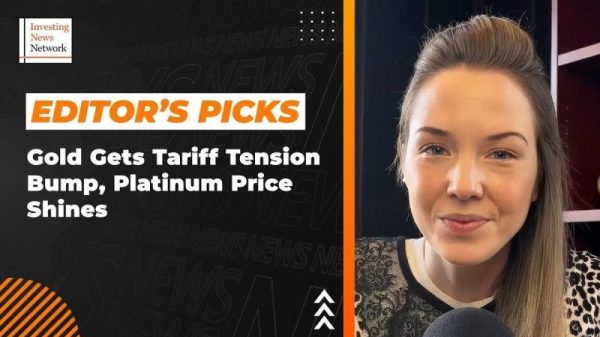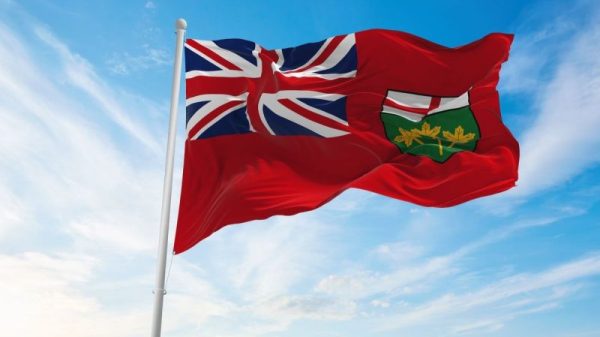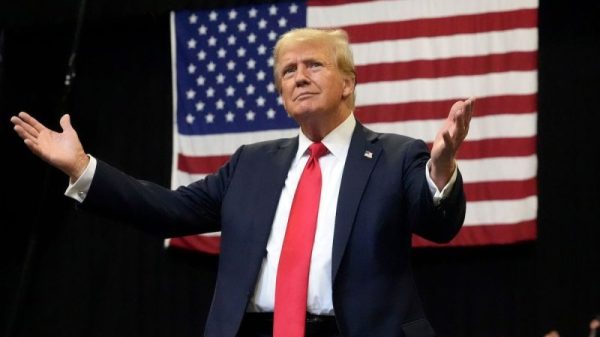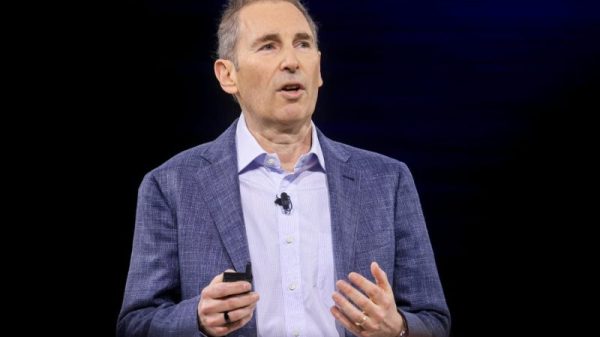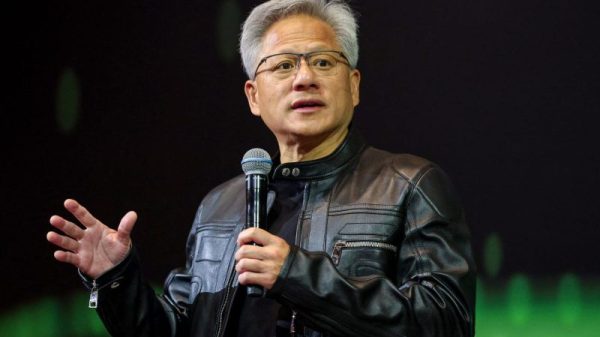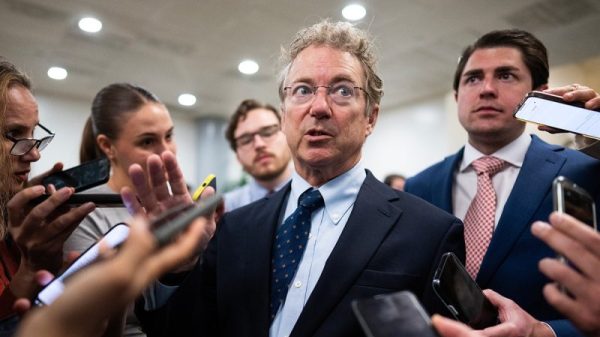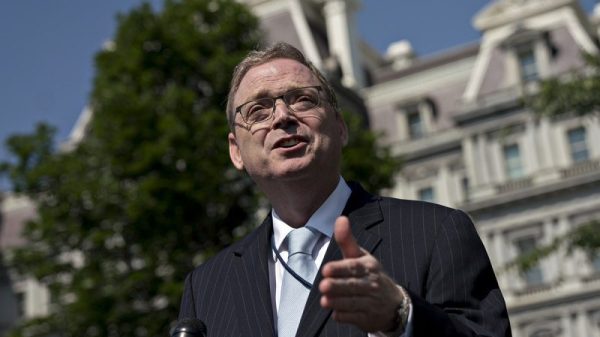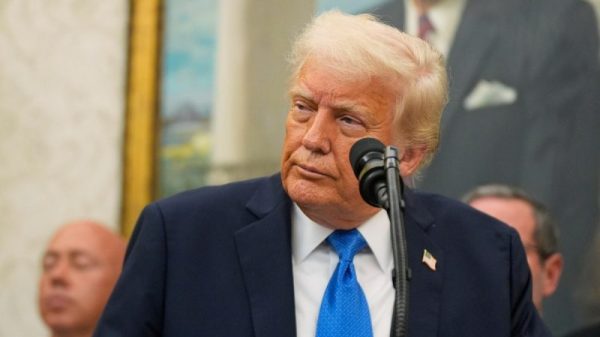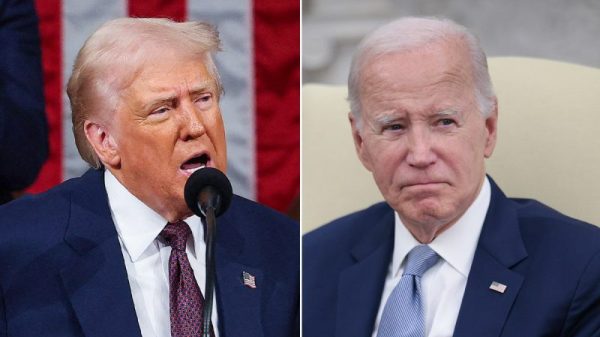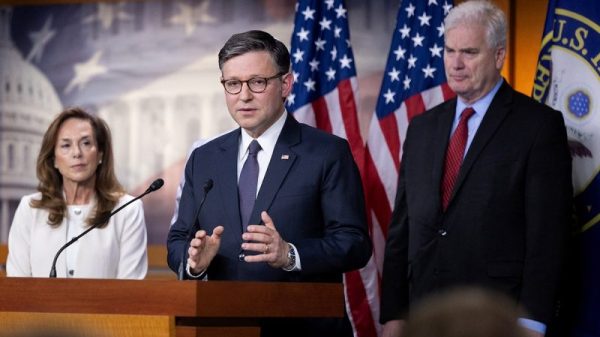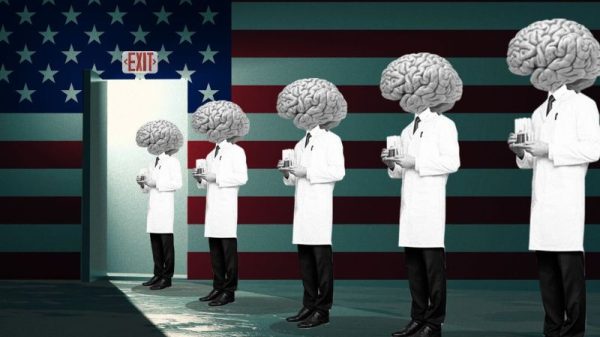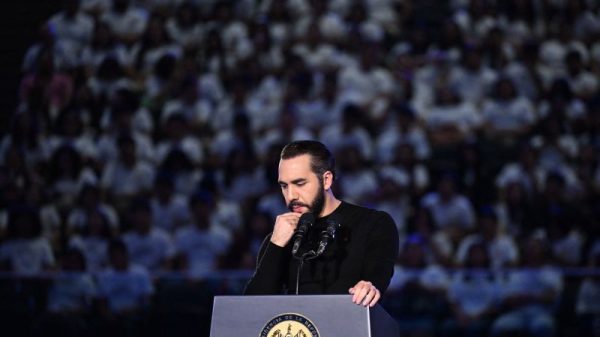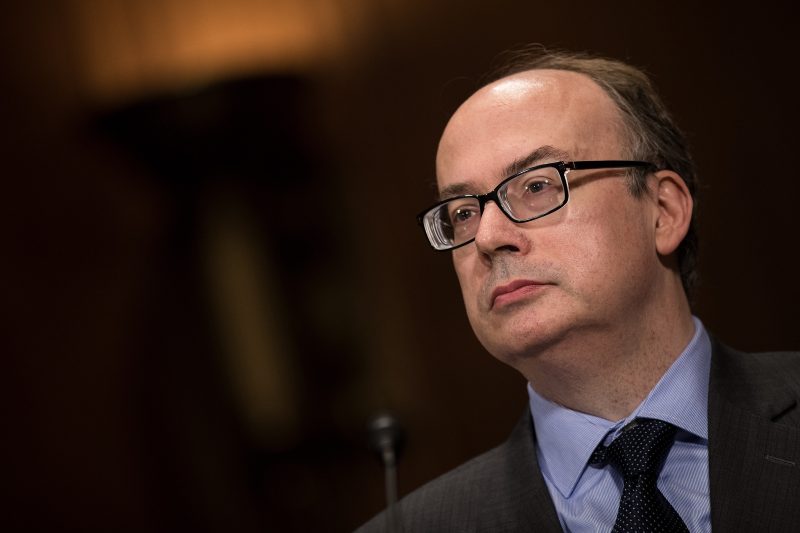ATLANTA — As a Justice Department lawyer after the 2020 election, Jeffrey Clark drafted and advocated for sending a letter to top Georgia officials declaring that the agency had reason to doubt the legitimacy of the state’s election after former president Donald Trump urged him to investigate allegations of fraud in the state, Clark’s lawyer told a federal judge Monday.
That authorization, Harry MacDougald argued, warrants that the criminal case against Clark, who was indicted last month in Fulton County, Ga., along with Trump and 17 others in connection with their efforts to overturn the 2020 election in Georgia, should be moved to federal court.
The request came through White House Chief of Staff Mark Meadows, but it was “coming from the President of the United States through Mr. Meadows,” MacDougald said. “That puts it in Mr. Clark’s lane.”
U.S. District Judge Steve C. Jones appeared wary of the claim, pressing MacDougald for evidence that Trump had directed Clark to act. MacDougald did not seem to offer any and appeared uncertain when Jones asked him whether Clark’s draft letter was written before or after he was introduced to Trump.
“What you’re arguing today is that Mr. Clark would not have been involved whatsoever in any of this up until former president Trump contacted him,” Jones said. “And if former president Trump doesn’t contact him, then Mr. Clark would not have been involved?”
“I think that’s right,” McDougald replied.
MacDougald described how Clark drafted the letter in his office at the Justice Department and used his DOJ email to send the document. He said it would be “simply impossible” for Clark to do what he is charged with if he were not acting as a federal official and said Trump had “ratified” his client’s conduct. MacDougald also noted that a meeting Clark later had with Trump in the Oval Office for more than three hours “is a complete ratification of everything that Mr. Clark did having anything to do with elections. It ratifies that it was within his lane because the President can put it in his lane. And he did.”
Clark waived his right to appear at the hearing Monday and was not in court. The former Justice Department official filed a “declaration” in which he sought to explain that his actions in question were undertaken in his capacity as a federal officer and warrant removing the case to federal court. But prosecutors objected to the document being introduced as evidence because they could not cross-examine Clark, and Jones agreed.
Clark’s sworn declaration, filed on the court docket on Sept. 14, did not appear to corroborate MacDougald’s claim in court Monday that Trump directed Clark’s actions. A spokesman for Trump did not immediately respond to a request for comment.
Clark has been charged with two counts in the sprawling indictment, which accuses the 19 defendants of participating in a criminal
conspiracy to steal the 2020 election. In addition to being charged with violating Georgia’s anti-racketeering law, Clark was also accused of attempting to create a false statement — a reference to his draft letter, which falsely claimed that the Justice Department was investigating irregularities in Georgia and encouraged state officials to send alternate slates of pro-Trump electors to Congress. DOJ leaders balked, and the letter was never sent.
The broader case is unfolding in Fulton County Superior Court and is the second criminal indictment involving Trump’s attempts to reverse his 2020 defeat. The first prosecution, led by special counsel Jack Smith, was filed in federal court in D.C. in August.
But Monday’s hearing was in federal court, where Clark is seeking to move his case, along with four other defendants in the Georgia case, claiming that he was acting as a federal officer. The defendants are pushing for removal under a federal law that allows people charged with crimes while carrying out their official duties to be prosecuted in federal court, even in cases involving state law and state prosecutors.
The others following the same legal path are former White House chief of staff Mark Meadows and three presidential electors who met on Dec. 14, 2020, to cast their votes for Trump after Georgia’s presidential election had been certified for Joe Biden.
Among the reasons Clark might want his case tried in federal rather than state court are access to a slightly more Republican jury pool; a denial of the prosecutorial team’s home-field advantage in Fulton County Superior Court, where the prosecutors and judges know each other and where the trial will be governed by familiar state, not federal, procedures; and a potentially quicker path to dismissal on the grounds that he is immune from prosecution as a federal officer.
Jones denied Meadows’s claim earlier this month, finding that the actions “at the heart of the State’s charges against Meadows were taken on behalf of the Trump campaign with the ultimate goal of affecting state election activities and procedures.” Meadows has appealed that decision.
The three electors — David Shafer, Shawn Still and Cathy Latham — are due in court for their own evidentiary hearing on Wednesday.
Jones’s opinion in the Meadows case could bode poorly for Clark, who was described by former senior Justice Department officials in a hearing of the House committee investigating the Jan. 6, 2021, attack on the U.S. Capitol as “completely incompetent” and guilty of currying favor with then-President Trump to become the next attorney general.
Prosecutors have made the case that Clark was operating far outside of his duties when he became involved in helping Trump reverse his defeat in 2020. They called to the stand Jody Hunt, a former longtime Justice Department official who preceded Clark as head of the civil division.
Hunt, who joined the DOJ in 1999 and also served as a chief of staff to Jeff Sessions when he was attorney general, left the agency in 2020 and was later among a group of attorneys who challenged efforts by the Trump campaign to overturn the 2020 election, including in Georgia.
Hunt repeatedly testified that the civil division did not engage in matters involving election interference or voter fraud. He said if the Justice Department did engage in any investigations or litigation, that it would have been taken up by the agency’s criminal or civil rights division.
“It is not the role of the civil division,” he said.
Hunt, now general counsel at a private college in Alabama, also testified about strict protocols that limit communications between the White House and Justice Department officials, telling the judge it was department policy for the president and any other White House official to communicate only with the attorney general, deputy attorney general and associate attorney general.
The policy was put into place “to avoid situations” where a White House official might ask a Justice Department employee to do something that did not fall in line with their duties, Hunt testified.
Prosecutors also took issue with several aspects of Clark’s defense, noting that he had provided little evidence that Trump had instructed him to act. MacDougald, his lawyer, also claimed that Clark had broad authority to enforce federal laws — but prosecutors noted that he did not say what law Clark was enforcing.
MacDougald focused extensively on what he claimed was the impropriety of a state prosecutor targeting internal Justice Department communications. He mentioned a declaration filed on Clark’s behalf Saturday by Edwin Meese, who served as attorney general under Ronald Reagan from 1985 to 1988.
With the opening line “I am 91 years old, and of sound mind,” Meese argued that the deliberations between a president and a senior Justice Department official are privileged and confidential — and that the prosecution of such behavior amounts to “a major affront to federal supremacy never before seen in the history of our country.”
If it is allowed to go forward, Meese added: “then state law enforcement officials could arrest local U.S. attorneys and their assistants while they were deliberating over whether and/or how to approach a possible prosecution of state or local officials.”
Donald Wakeford, a member of the Fulton prosecution team, rebutted that administration of elections is the province of state, not federal, government — and Clark had cited no federal laws to support the claim that some had been violated.
Wakeford likened Clark’s actions to those of “marshals in the Old West” and accused MacDougald of making only a “vague allusion” that Trump may have asked Clark to act. “And we have no evidence of that, either,” he said.
When Jones asked Wakeford to respond to MacDougald’s claim that the Fulton County district attorney has no authority to prosecute internal Justice Department communications, Wakeford replied that an attempted crime in the state of Georgia is within his office’s jurisdiction. Jones appeared to nod vigorously.
Clark suffered an early defeat in his removal efforts when Jones denied his request for an emergency stay that would prevent Fulton County District Attorney Fani T. Willis (D) from proceeding while his bid for federal removal was active.
As Trump faces four criminal indictments, including two focused on his attempts to stay in power after the election, Clark’s hearing provided yet another preview of what could come in the months ahead.
Clark’s role in the alleged conspiracy to overturn the 2020 results is vividly documented in the federal indictment of Trump.
The indictment identifies Clark only as “Co-Conspirator 4,” but it includes details that match existing reporting about Clark’s post-election role. It portrays him as a linchpin of plans to bypass the acting attorney general and use the imprimatur of the Justice Department to spread “knowingly false claims of election fraud” and deceitfully substitute legitimate electors with sham alternates supporting Trump.
Clark circumvented department leadership to speak with Trump multiple times in late December and early January, according to the federal indictment.
After the Justice Department officials refused to sign his draft letter, the indictment states, Clark “tried to coerce” them into signing the letter by saying that Trump was offering to make him acting attorney general. Clark accepted that offer on Jan. 3, 2021, according to the indictment.
The machinations led to a dramatic showdown in the Oval Office on the evening of Jan. 3, when Trump balked, retreating from his plan to promote Clark, after being warned that Justice Department leaders and White House lawyers would resign en masse.
Richard Donoghue, who was acting deputy attorney general at the time, testified before the House Jan. 6 committee that he was unequivocal about his opposition to Clark becoming attorney general when Trump inquired about it.
“Suppose I do this. Suppose I replace him, Jeff Rosen, with him, Jeff Clark, what would you do?” Donoghue recalled Trump asking him. “And I said, ‘Mr. President, we resign immediately. I’m not working one minute for this guy who I just declared was completely incompetent.’”
Trump then wavered about appointing Clark attorney general. The promotion never happened.
In the Georgia indictment, Clark is also described as taking a call on Jan. 2, 2021, from Scott G. Hall, another co-defendant in the case and a longtime bail bondsman from the Atlanta area who actively chased claims of election fraud on Trump’s behalf in the weeks following the 2020 election. Hall and Clark spoke for 63 minutes, according to the indictment, and the call appeared to carry weight. Clark would later cite the conversation as he sought to use Justice Department authority to delegitimize the Georgia election, according to testimony and notes from congressional investigators.
In his removal case, Clark claimed that to cite the phone call as an act in furtherance of a conspiracy, as Willis does in the Georgia indictment, is a flagrant violation of Clark’s First Amendment speech protections. He also said it violates Hall’s First Amendment right to petition government “for redress of grievances.”
The call did not come up at Monday’s hearing.
An earlier version of this story stated that an attorney for former Justice Department official Jeffrey Clark told a federal judge Monday that Clark drafted a letter to top Georgia officials declaring that the department had reason to doubt the legitimacy of the state’s election only after he was pressed to do so by then-President Donald Trump. In fact, the lawyer, Harry MacDougald, said Clark drafted and advocated sending the letter after Trump’s chief of staff urged him to investigate potential fraud in Georgia. MacDougald said a meeting Trump and Clark later had in the Oval Office served as “a complete ratification of everything that Mr. Clark did having anything to do with elections. It ratifies that it was within his lane because the President can put it in his lane. And he did.’ The article has been updated.

